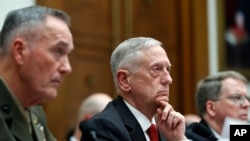U.S. Defense Secretary Jim Mattis described the diplomatic spat between Qatar and several other American allies in the Middle East as a “complex situation” that the United States needed to help solve.
“I believe that (Qatar’s) Prince Thani inherited a difficult, very tough situation, and he’s trying to turn the society in the right direction,” Mattis told lawmakers at a House Armed Services Committee hearing late Monday. “But we all agree that funding of any kind of terrorist group is inimical to all of our interest.”
Mattis said President Donald Trump was focused on stopping all terrorist funding, including what he called “grey funding.”
“It’s not black and white; it goes into some kind of nebulous area,” he said.
He added that he believed Qatar is “moving in the right direction” when it comes to curtailing its funding of terrorism and said the United States needed to find common ground with Qatar due to the two countries’ shared interest.
Qatar’s Al-Udeid Air Base is the largest American air base in the Middle East, serving as the forward operational headquarters of U.S. Central Command and the host to about 10,000 American troops.
Saudi Arabia, Bahrain, Egypt, Yemen and the United Arab Emirates have cut diplomatic ties with Qatar and stopped transportation to and from the tiny Gulf nation, accusing Qatar of funding terrorists groups including Hamas and the Muslim Brotherhood.
During the hearing, Congressman Adam Smith (D-Washington) said he was “not clear” on the administration’s strategy concerning Qatar, accusing President Trump of being unhelpful Friday when he lashed out against Qatar and sided with Saudi Arabia.
“We should be finding ways to solve that problem, not throwing gasoline on the fire,” Smith said.
Afghanistan
When asked about the military strategy in Afghanistan, Secretary Mattis said he would present options “very soon” to the president.
Mattis added that it was important to include the relationships between India, Pakistan, Afghanistan and Iran in the U.S. strategy.
“We are taking a regional approach to this,” he said, “because if we look at it in isolation, we’ll probably have something that’s lacking.”
Earlier this year, the top U.S. commander in Afghanistan, General John Nicholson, described the situation in the war-torn country as a “stalemate.”
Officials have said the strategy in Afghanistan needs to be flexible enough to provide the tools needed for Afghan forces to put more pressure on the Taliban.
“It’s not just about numbers of troops. It’s about authorities. It’s about other things we can do diplomatically and economically as well,” Chairman of the Joint Chiefs of Staff General Joseph Dunford, the top U.S. general, told lawmakers Monday.
Increased authorities could allow American troops to work with Afghan troops below the corps level, potentially putting them closer to fighting.




